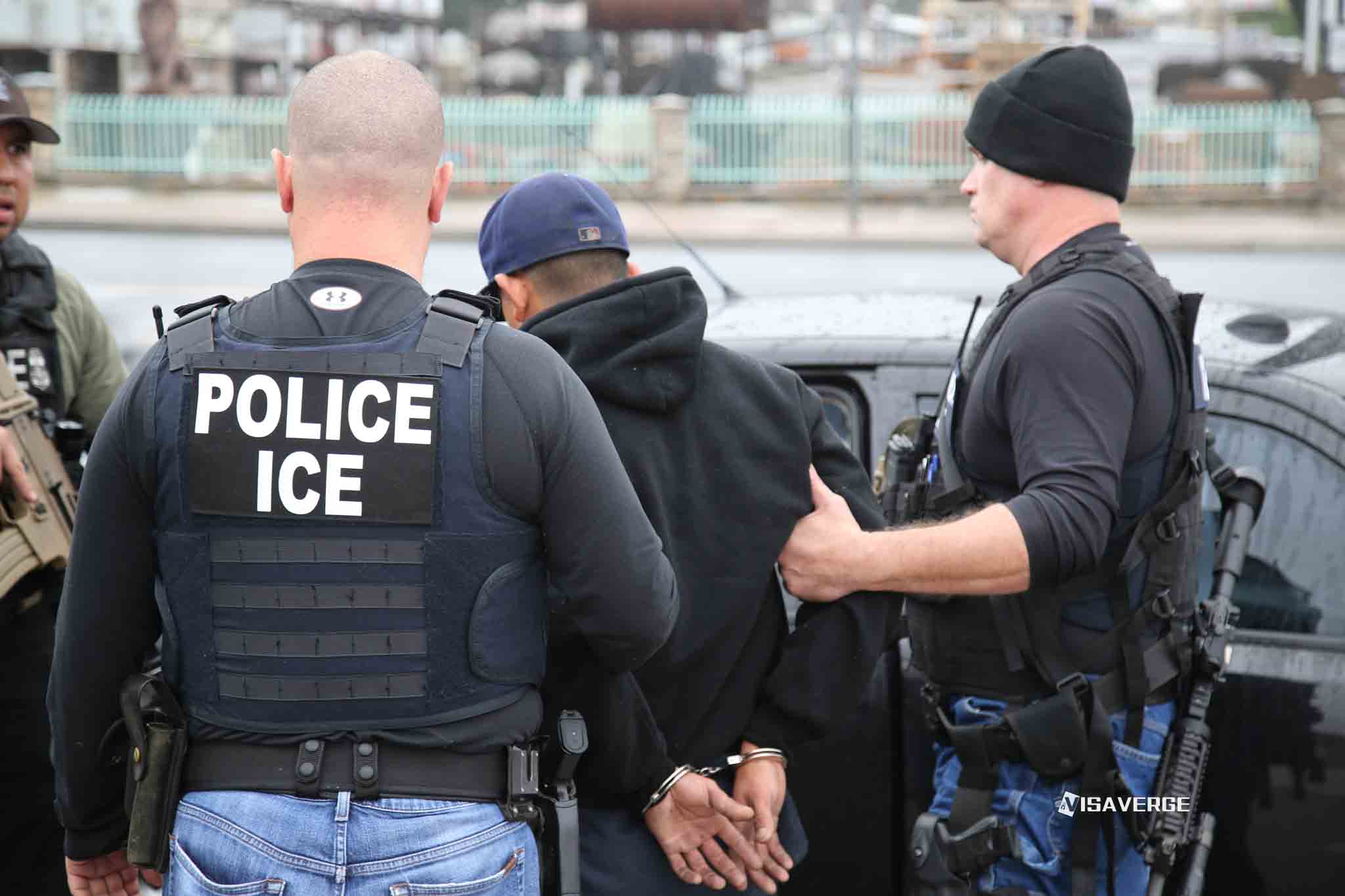Key Takeaways
• DHS announced a crackdown on visa overstayers after a 2025 terrorist attack by Mohammed Sabry Soliman.
• Expedited removal and heightened enforcement target overstayers, especially from high-risk countries with visa bans starting June 4, 2025.
• Over 565,000 visa overstays occurred in 2023, prompting new policies tightening visa issuance and expanding penalties.
On June 4, 2025, the Department of Homeland Security (DHS) announced a sweeping new crackdown on foreign nationals who have overstayed their visas in the United States 🇺🇸. This urgent move comes in direct response to a terrorist attack in Boulder, Colorado, carried out by Mohammed Sabry Soliman, an Egyptian national who had remained in the country unlawfully since 2022. The attack, which targeted a pro-Israel rally, left several Americans severely injured and has been classified as both a federal hate crime and a state felony. The incident has reignited national debate over visa enforcement and prompted DHS to take immediate and far-reaching action.
DHS Orders Immediate Action on Overstayed Visas

The Department of Homeland Security, led by Secretary Kristi Noem, has directed all major immigration agencies—including U.S. Customs and Border Protection (CBP), Immigration and Customs Enforcement (ICE), and U.S. Citizenship and Immigration Services (USCIS)—to prioritize the identification, investigation, and removal of individuals who have overstayed their visas. This directive is not limited to any one group; it covers all visa categories but places special focus on people from countries with high overstay rates and those considered national security threats.
Secretary Noem made the administration’s position clear, stating, “There is NO room in the United States for the rest of the world’s terrorist sympathizers. Anyone who thinks they can come to America and advocate for antisemitic violence and terrorism – think again. You are not welcome here. We will find you, deport you, and prosecute you to the fullest extent of the law.”
What Is a Visa Overstay?
A visa overstay happens when a person enters the United States 🇺🇸 legally on a temporary visa—such as a tourist, student, or business visa—but remains in the country after their authorized period has ended. Overstaying a visa is a violation of U.S. immigration law and can lead to serious consequences, including deportation, legal penalties, and bans on returning to the country.
Why the Crackdown Now?
The Boulder attack by Mohammed Sabry Soliman, who had overstayed his visa since 2022, brought renewed attention to the risks posed by individuals who remain in the United States 🇺🇸 after their visas expire. According to analysis from VisaVerge.com, visa overstays have long been a weak spot in the country’s immigration system, sometimes even outnumbering people who enter the country without permission at the border.
The attack has led to urgent calls for stronger enforcement, especially since some of the 9/11 hijackers also overstayed their visas. National security experts argue that closing this gap is essential to keeping the country safe.
Key Changes and Enforcement Measures
The new DHS directive includes several immediate and long-term changes:
1. Ramp-Up of Immigration Record Checks
- USCIS, CBP, and ICE are now systematically reviewing immigration records to identify individuals who have overstayed their visas.
- The agencies are using advanced data systems to flag potential overstays and prioritize cases that may pose security risks.
2. Expedited Removal and Legal Penalties
- ICE will begin expedited removal proceedings against those found to have overstayed their visas. Expedited removal allows the government to deport individuals quickly, often without a court hearing, especially if they cannot prove they have been in the United States 🇺🇸 for at least two years.
- Overstayers may also face legal penalties, including fines, imprisonment, and multi-year bars on returning to the country. These penalties could become even harsher if Congress passes the proposed Visa Overstay Enforcement Act of 2023 (H.R.777).
3. Policy Revisions for Visa Issuance
- USCIS is tightening the rules for issuing visitor visas and for the Visa Waiver Program. This means it will be harder for people from countries with high overstay rates to get new visas.
- The agency is also increasing scrutiny of student and exchange visitor visa applications, especially from countries with high rates of overstays.
4. Country-Specific Entry Suspensions
- As of June 4, 2025, the United States 🇺🇸 has suspended entry for all nationals from Afghanistan, Burma, Chad, Haiti, and Iran as both immigrants and nonimmigrants. This means people from these countries cannot enter the United States 🇺🇸 for any reason, including tourism, study, or work, due to high overstay rates and security concerns.
The Numbers Behind Visa Overstays
Visa overstays are not a small problem. According to DHS data:
- In 2023, an estimated 565,000 temporary visa holders overstayed their terms. About 55,000 of these people left by the end of the fiscal year, but more than 500,000 remained in the country unlawfully.
- Student and exchange visitor visa holders had an average overstay rate of nearly 4%. Some countries had much higher rates:
- Equatorial Guinea: 70%
- Eritrea: 54%
- Burma: 40%
- Egypt: Nearly 3,300 Egyptians overstayed their visas in 2022.
- Afghanistan: 9.7% overstay rate for B-1/B-2 (tourist/business) visas; 29.3% for student and exchange visas.
- Burma: 27.07% for B-1/B-2; 42.17% for student and exchange visas.
- Chad: 49.54% for B-1/B-2; 55.64% for student and exchange visas.
- Haiti: 31.38% for B-1/B-2; 25.05% for student and exchange visas.
These numbers show why the Department of Homeland Security is focusing on certain countries and visa categories.
How Enforcement Works: Step-by-Step
The new enforcement process involves several steps:
- Immigration Record Review: Agencies review records to find people who may have overstayed their visas.
- Investigation and Apprehension: ICE investigates and, if necessary, arrests individuals who are suspected of overstaying, especially if they are considered security risks.
- Expedited Removal: If someone is found to have overstayed and cannot prove two years of continuous presence in the United States 🇺🇸, they can be deported quickly without a court hearing.
- Legal Penalties: Overstayers may face fines, jail time, and bans on returning to the United States 🇺🇸 for several years.
- Policy Revision and Visa Issuance: USCIS updates its rules to make it harder for people from high-risk countries to get new visas.
For more details on how expedited removal works, you can visit the official ICE website.
Impact on Different Groups
Visa Holders
- Increased risk of detection: Anyone who has overstayed a visa is now at higher risk of being found and deported.
- Expedited removal: Many will not have the chance to see an immigration judge before being removed.
- Long-term bans: Overstayers may be barred from returning to the United States 🇺🇸 for several years, or even permanently, depending on the length of the overstay and any criminal activity.
Employers
- Greater scrutiny: Employers must be extra careful to check the immigration status of their workers. The Department of Justice has expanded its whistleblower program, offering financial rewards to people who report companies that hire unauthorized workers or misuse visas.
- Compliance audits: Companies should conduct regular audits of their hiring practices to avoid legal trouble and protect their reputation.
Students and Exchange Visitors
- Higher scrutiny: Students and exchange visitors from countries with high overstay rates will face tougher checks and may have a harder time getting visas.
- Possible denials: Some may be denied visas altogether if their country is on the suspension list or if they cannot show strong ties to their home country.
Affected Communities
- Fear of enforcement: Immigrant communities may feel more pressure to carry documents proving their legal status at all times.
- Risk of profiling: Civil liberties groups warn that increased enforcement could lead to racial profiling and mistakes, with lawful residents or even citizens being wrongly targeted.
Legal and Legislative Context
The Visa Overstay Enforcement Act of 2023 (H.R.777) is a bill in Congress that would impose even tougher penalties for visa overstays, including fines, jail time, and multi-year bans on reentry. While this bill is not yet law, the current administration is already using existing legal tools to speed up removals and impose penalties.
The Department of Homeland Security is also using powers granted by a January 2025 executive order, which allows for expanded expedited removal of undocumented immigrants and those who cannot prove two years of continuous presence in the country.
Background: Why Visa Overstays Matter
Visa overstays have been a major issue in U.S. immigration for decades. In fact, more people are believed to be living in the United States 🇺🇸 after overstaying visas than those who entered without permission at the border. Calls for better tracking, such as biometric exit systems (using fingerprints or facial recognition), have been around for years, but progress has been slow due to cost and technical challenges.
High-profile incidents, like the Boulder attack by Mohammed Sabry Soliman, often lead to renewed focus on this issue. National security experts point out that visa overstays have been linked to past terrorist attacks, making enforcement a top priority for the government.
Multiple Perspectives: Security vs. Civil Liberties
While many support the crackdown as necessary for national security, others raise concerns about fairness and civil rights.
- National security experts say that closing the visa overstay gap is essential to prevent future attacks.
- Civil liberties advocates warn that expanded expedited removal and increased document checks could lead to racial profiling and mistakes, harming lawful residents and citizens.
- Immigration attorneys advise people and employers to keep careful records and be ready for increased enforcement.
- Judicial voices—including recent Supreme Court dissents—have highlighted the risks of removing protections before court challenges are finished, especially for people with strong family or humanitarian ties.
What Should Visa Holders and Employers Do Now?
If you are in the United States 🇺🇸 on a visa, it is more important than ever to:
- Keep your documents up to date. Make sure you know when your visa expires and apply for extensions or changes of status well before the deadline.
- Carry proof of legal status. Always have a copy of your visa, I-94 record, or other proof of lawful presence.
- Consult an immigration attorney if you are unsure about your status or have overstayed your visa.
Employers should:
- Audit your workforce. Make sure all employees have valid work authorization.
- Train HR staff to recognize and handle immigration documents properly.
- Respond quickly to any government requests for information.
Looking Ahead: What’s Next for Visa Overstay Enforcement?
The Department of Homeland Security and the Department of Justice are expected to keep up or even increase enforcement, especially for people from countries with high overstay rates or security concerns. If Congress passes new laws like the Visa Overstay Enforcement Act, penalties will become even tougher.
USCIS will likely continue to tighten visa rules and screening, especially for visitors from high-risk countries. The expanded expedited removal policy, which allows for rapid deportation of undocumented immigrants and those unable to prove two years of continuous presence, remains in effect.
Where to Find Official Information
For the most current updates and official guidance, visit:
- U.S. Citizenship and Immigration Services (USCIS)
- U.S. Customs and Border Protection (CBP): www.cbp.gov
- U.S. Immigration and Customs Enforcement (ICE): www.ice.gov
- Department of Homeland Security (DHS): www.dhs.gov
If you need to check your I-94 travel record or apply for an extension, you can do so on the official CBP I-94 website.
Summary Table: Key Enforcement Actions and Implications
| Action/Policy | Effective Date | Target Group(s) | Main Implications |
|---|---|---|---|
| DHS visa overstay crackdown | June 4, 2025 | All visa overstays, esp. high-risk | Expedited removal, bars, legal penalties |
| Country-specific entry bans | June 4, 2025 | Afghanistan, Burma, Chad, Haiti, Iran | Total suspension of entry for all nationals |
| DOJ whistleblower expansion | May 2025 | Employers of noncitizens | Increased reporting, financial incentives |
| Expanded expedited removal | Jan 21, 2025 | Undocumented, recent arrivals | Rapid deportation, burden of proof on immigrant |
Final Takeaways
The Department of Homeland Security’s new focus on overstayed visas marks a major shift in U.S. immigration enforcement. The attack by Mohammed Sabry Soliman has put a spotlight on the risks of visa overstays and led to tough new measures. If you are a visa holder, employer, or part of an affected community, it is important to stay informed, keep your documents in order, and seek legal advice if needed.
For more detailed information and updates, always rely on official government sources and consult with qualified immigration professionals.
Learn Today
Visa Overstay → Remaining in the U.S. beyond the authorized period granted by a temporary visa.
Expedited Removal → A fast deportation process without court hearings for certain immigration violations.
CBP → U.S. Customs and Border Protection, agency managing border security and immigration enforcement.
ICE → Immigration and Customs Enforcement, responsible for identifying and deporting immigration violators.
Visa Waiver Program → A U.S. program allowing nationals from certain countries to enter without a visa for short stays.
This Article in a Nutshell
The Department of Homeland Security intensified visa overstay enforcement following a terror attack in 2025. New rules expedite removals, tighten visa issuance, and ban entry from certain countries. These changes respond to over 500,000 overstayers and aim to strengthen national security, impacting visa holders, employers, and affected communities nationwide.
— By VisaVerge.com








